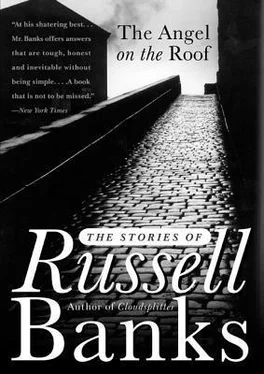My father grinned and nodded and said, “Good, good. You’re doing fine. Real fine.”
The ride home, about seven miles, seemed to take mere seconds. My father and I talked almost not at all, which, normal for us, seemed especially so that day. My mind was filled with a new sense of my body, a sense that, while it may well have been made of some kind of malleable substance, it nonetheless possessed a shrewd, persistently willful, and possibly cruel mind of its own.
I did not see the trees and fields as we passed, did not even notice that we were home, until my father, having shut off the motor and opened his door, said, “You coming in or going to sit there till dark?” I jumped, but then saw that he was smiling.
As soon as we were inside the house, my mother rushed to me, and I quickly showed her my skates and said that I had learned how to ice-skate. My father did not contradict me. Taking off our coats, he and I stood together near the stove for a few minutes, warming our hands and feet, and when I asked him if we could go skating again soon, he said, “Sure. Tomorrow, if you want.”
I said that I wanted to, right after breakfast, and he grinned at me with appreciation and then at my mother in triumph.
Trying to remember if I’ve ever seen any pictures, snapshots, of my father and me that show us skating together, I realized that none of the pictures that have come down to me from those years shows us, any of us, in the winter. The wintertime snapshots inevitably are of the house banked in with head-high snowdrifts, the dates and descriptive comments always written on the back by my mother.
Jan. 12 th, 1943! Wow! The big one! Taken to impress our cousins living in regions to the south of us, a way for us to brag of our hardiness.
Our house, March 21 st, 1946! First day of spring! Ha-ha! Just the house, or maybe nothing more than the fluff-crowned roof and tops of the windows barely visible above the snow. There are never any people to be seen. My mother and my brother and I must be inside the house, looking out of one of those dark, small-pane windows at my father, who stands out by the road, snow up to his waist. Holding the box camera squarely in front of his belt buckle, he squints down into the viewfinder, finds the view sufficiently desolate, and snaps the picture.
Probably the cameras most people owned in those days were not very effective in the dim, gray light of winter. But even so, it is odd that fully one-half of our yearly existence then is represented by fewer than a dozen pictures of our house and automobile, when the other half of the year seems to have been photographed endlessly.
Another curious aspect is that, even though my memories of those years are almost completely of summertime, it was the winter that dominated our activities, filling our talk and views of the rest of the world, so that we could not even speak of a place without first mentioning that it enjoyed a kinder climate than ours. Of events that took place in summer, however, I recall only the general condition and have obtained my formal knowledge of the events themselves solely as data. It’s as if they could as easily have occurred in someone else’s life.
The context of an event, the textures, physically, emotionally, spiritually, these remain uniquely our own; the particulars of an event, what we use to name it for strangers, are no more ours alone than our dates of birth. Perhaps this is why so much of the act of remembering is an act of the body, and why, sitting in my living room late at night, I can recall none of the particular, isolate experiences that, inevitably, come to me in a solid, complete block when, at the end of a November day, I grab my ice skates off the nail in the barn, walk across the road, and cross through the gray butts of winter grass to the pond. The sky is like a peach-colored sheet drawn taut at the horizon, a high rim miles away that circles the center of the pond. The air is still, thin, and cold. In a week, there will be a thick pelt of snow over everything that today stands before me like gray, brown, and lavender bone, cleaned and scoured by cold alone, neither dead nor dormant, but fixed, held in time the way a snapshot freezes a gesture at its completion or its start. And as long as the fading daylight holds, the pond, black and smooth as a gigantic lens, is the precise center of the sphere of space into which I have placed myself. I cannot see the house or the road from here, can see no way out.
I sit on the steep, rock-hard eastern bank and take off my boots and put on my skates, and when I stand up, I am on the ice, moving across the black surface of the pond like a man running slowly through a dream, on a level plane, but also inside a matrix, as if underwater, free of gravity’s grating tug, and free as well to ply the weight of my body gracefully against it, like a dancer sliding against the felt measures of time.
You are in Richmond, Virginia, and you can’t remember your mother. She was an actress, she was beautiful, they say. No one remembers your father. Of him they say nothing, and so, you believe, it is “natural” that you do not remember him. But your mother carried you here to the city of Richmond — in her arms, in her arms. She languished through the sweltering months of summer. The play moved on to Charleston without her. Her pain increased daily. The coughing from the attic room, the groans, the sudden shrieks. The women muffled your ears against them. You were bad, a bad boy, bad little boy. She died. You can’t remember her face, her touch, her smell, her voice, all of which were beautiful, they say. They tell you this even today, the few who knew her those last months. Women, young women then, old women now. You remind them of her. If only they could remind you of her. You are Edgar Poe the poet, author of “The Raven.” In a few moments, you will recite that beloved, that “magnificent and profound” poem to the literary citizens of Richmond, Virginia. Afterwards, in the Reverend Doctor Woolsey’s parlor, you will describe how you actually composed the poem, the rational procedures by which you constructed it, and they will be amazed. You, too, will be amazed at this new account of your ingenuity and self-sufficiency, your mastery of the intricacies and logic of language and emotion. And your mother would be amazed, had she lived to see it, hear it, watch you mystify them by means of demystification, enchant them by means of disenchantment, bewilder them with your clarity. They will feel privileged and released, for you will have demonstrated how any one of them could have written your beloved poem himself, had he merely been willing to apply himself to the task. But you, of course, have been the only one willing to apply himself to the task, and that is the reason the poem is yours, the reason you are its author, Edgar Poe the poet. Anyone could be Edgar Poe the poet, anyone, were he merely willing to apply himself to the task. You believe that, and when you politely excuse yourself and depart from the company of these literary ladies and gentlemen of Richmond, Virginia, they will believe it, too. It will give them a certain relief. How wonderful, they will each separately think, to know that one could be Edgar Poe the poet if one merely applied oneself to the task. And how wonderful, they will each separately think, to be free not to apply oneself to the task! They will each accept one more glass of sherry, and, in your absence, will admire your elegant yet forceful presence upon the stage, your charm and lucidity in private conversation, your erudition, your “profound and tender” eyes, your “musical” voice, all quite as if each person in the room were separately admiring his own presence upon the stage, his own charm, lucidity, erudition, eyes, voice. They will each separately admire your irresistibly beautiful mind. Your fame. Your position among men. Your role with women. Your exotic past. Your dead mother.
Читать дальше












